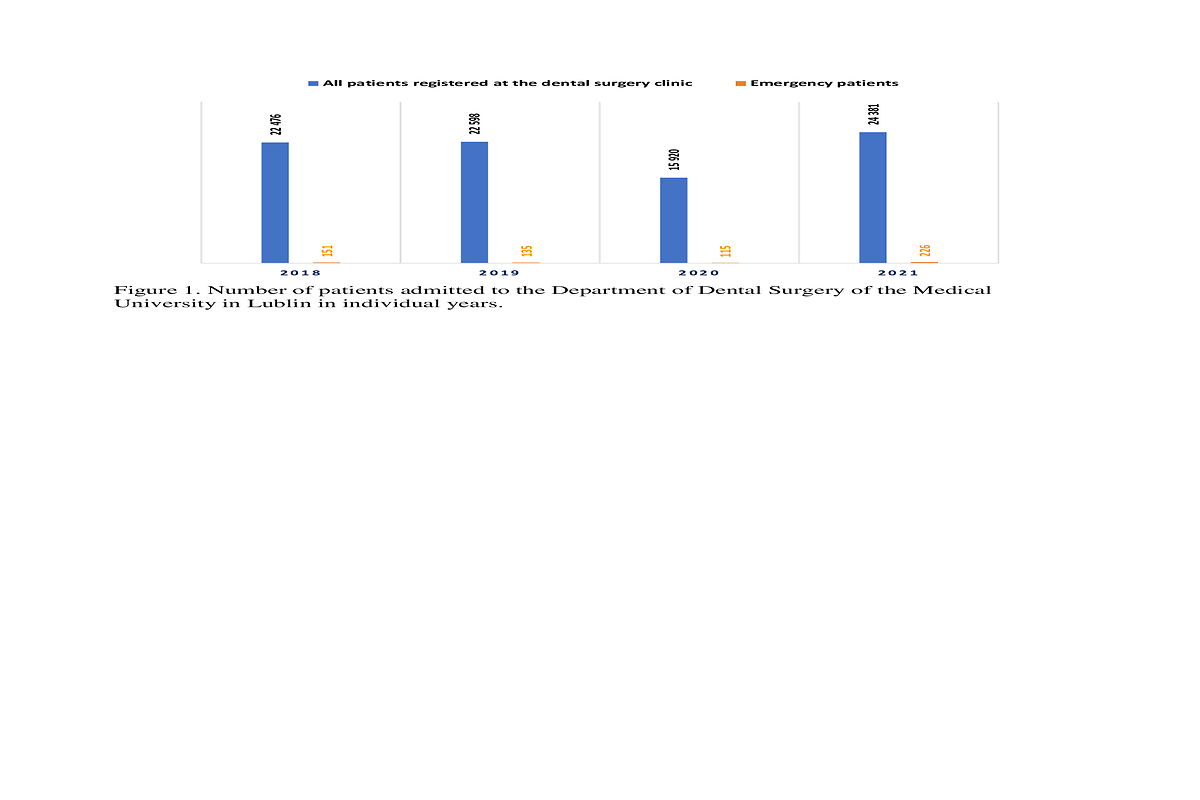RESEARCH PAPER
Stany nagłe w chirurgii stomatologicznej w czasie pandemii COVID-19
1
Student Scientific Circle at the Chair and Department of Dental Surgery, Medical University, Lublin, Poland
2
Chair and Department of Dental Surgery, Medical University, Lublin, Poland
Corresponding author
Karolina Wypych
Karolina Wypych, Student Scientific Circle at the Department of Dental Surgery, Medical University, Chodźki 6, 20-093 Lublin, Poland
Karolina Wypych, Student Scientific Circle at the Department of Dental Surgery, Medical University, Chodźki 6, 20-093 Lublin, Poland
Med Og Nauk Zdr. 2023;29(1):36-38
KEYWORDS
TOPICS
Biomedyczne aspekty zdrowia i chorobyZdrowie publiczneEpidemiologiaPromocja zdrowia i edukacja zdrowotna
ABSTRACT
Introduction:
Patients’ negligence and difficult access to healthcare have an impact on the worsening of emergency conditions, which require immediate treatment due to the possibility of exacerbation in a short period of time. Untreated intra- and extraoral abscesses can have serious consequences on the patient’s health and in many cases are life-threatening conditions increasing risk of respiratory obstruction, thrombophlebitis, meningitis, mediastinitis and septicemia.
Objective:
The aim of this study is to investigate the impact of the pandemic and the resulting impediments to accessing medical care on the incidence and type of emergencies in the Oral Surgery Department.
Material and methods:
This was a retrospective study of 85375 patients aged 2 months to 90 years old with diagnosed intra- and extraoral abscesses before COVID-19 pandemic (2018,2019), and during pandemic (2020, 2021) in the Department of Oral Surgery of the Medical University in Lublin. The obtained results were statistically analyzed with the use of a computer program.
Conclusions:
The fewest patients were admitted in 2020, and the most in 2021, where we can already see the effects of the pandemic. Emergencies occurred most frequently in people aged 21–30, then 31–40. In 365 cases, tooth extraction was performed, and only in 28 cases, root canal treatment was attempted. Conclusions. Oral health service provision has been significantly affected by COVID-19. Patients came to their appointments too late, which in most cases resulted in the necessity of tooth extraction without attempting root canal treatment.
Patients’ negligence and difficult access to healthcare have an impact on the worsening of emergency conditions, which require immediate treatment due to the possibility of exacerbation in a short period of time. Untreated intra- and extraoral abscesses can have serious consequences on the patient’s health and in many cases are life-threatening conditions increasing risk of respiratory obstruction, thrombophlebitis, meningitis, mediastinitis and septicemia.
Objective:
The aim of this study is to investigate the impact of the pandemic and the resulting impediments to accessing medical care on the incidence and type of emergencies in the Oral Surgery Department.
Material and methods:
This was a retrospective study of 85375 patients aged 2 months to 90 years old with diagnosed intra- and extraoral abscesses before COVID-19 pandemic (2018,2019), and during pandemic (2020, 2021) in the Department of Oral Surgery of the Medical University in Lublin. The obtained results were statistically analyzed with the use of a computer program.
Conclusions:
The fewest patients were admitted in 2020, and the most in 2021, where we can already see the effects of the pandemic. Emergencies occurred most frequently in people aged 21–30, then 31–40. In 365 cases, tooth extraction was performed, and only in 28 cases, root canal treatment was attempted. Conclusions. Oral health service provision has been significantly affected by COVID-19. Patients came to their appointments too late, which in most cases resulted in the necessity of tooth extraction without attempting root canal treatment.
REFERENCES (7)
1.
Alsharif W, Qurashi A. Effectiveness of COVID-19 diagnosis and management tools: A review. Radiography (Lond). 2021;27(2):682–687. https://doi.org/10.1016/j.radi....
2.
Gujski M, Raciborski F, Jankowski M, et al. Epidemiological Analysis of the First 1389 Cases of COVID-19 in Poland: A Preliminary. Report. Gujski M, et al. Med Sci Monit. 2020;26:e924702. https://doi. org/10.12659/MSM.924702.
3.
Eggmann F, Haschemi AA, Doukoudis A, et al. Impact of the COVID-19 pandemic on urgent dental care delivery in a Swiss university center for dental medicine. Clin Oral Investig. 2021;25(10):5711–5721. https:// doi.org/10.1007/s00784-021-03872-1.
4.
Andrzejczak-Grządko S, Czudy Z, Donderska M. Side effects after COVID-19 vaccinations among residents of Poland. Eur Rev Med Pharmacol Sci. 2021;25(12):4418–4421. https://doi.org/10.26355/eurre..._ 202106_26153.
5.
Chiapasco M. Chirurgia stomatologiczna. 3rd ed. Edra Urban & Partner; 2020. p. 201–223.
6.
Pylińska-Dąbrowska D, Starzyńska A, Cubała WJ, et al. Psychological Functioning of Patients Undergoing Oral Surgery Procedures during the Regime Related with SARS-CoV-2 Pandemic. J Clin Med. 2020; 9(10):3344. https://doi.org/10.3390/jcm910....
7.
Tadin A, Poljak Guberina R, Domazet J, et al. Oral Hygiene Practices and Oral Health Knowledge among Students in Split, Croatia. Healthcare (Basel). 2022;10(2):406. https://doi.org/10.3390/health....
Share
RELATED ARTICLE
We process personal data collected when visiting the website. The function of obtaining information about users and their behavior is carried out by voluntarily entered information in forms and saving cookies in end devices. Data, including cookies, are used to provide services, improve the user experience and to analyze the traffic in accordance with the Privacy policy. Data are also collected and processed by Google Analytics tool (more).
You can change cookies settings in your browser. Restricted use of cookies in the browser configuration may affect some functionalities of the website.
You can change cookies settings in your browser. Restricted use of cookies in the browser configuration may affect some functionalities of the website.



